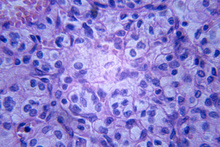
Pancreatic cancer is the fourth most fatal caner.Photo / Thinkstock
Australian scientists have cracked a genetic mystery surrounding one of
the deadliest cancers, potentially paving the way for new treatments.
Pancreatic cancer is the fourth leading cause of cancer death, with the
highest mortality rate of all major cancers. Less than five per cent of
patients survive five years past diagnosis, a statistic that has not changed in
almost 50 years.
Two Australian scientists led an international team in the largest ever
in-depth study to sequence the DNA structure of 100 pancreatic tumours. The
study identified more than 2000 genetic mutations, including the KRAS gene
found in about 90 per cent of samples, while thousands of other mutations were
present in only one or 2 per cent of tumours.
One of the lead scientists, Professor Sean Grimmond from the University
of Queensland, said this suggested that each patient might need to be treated
quite differently, given the diversity of genetic mutations behind the cancer. The
research also revealed a genetic pathway for the development of nerve cells was
damaged in the tumours. Professor Andrew Biankin from Sydney's Garvan Institute
of Medical Research said this axon guidance pathway was frequently impaired in
pancreatic cancer patients and was often associated with a poorer outcome for
those people. "To see genetic changes in that pathway opens the door for
potential new therapies in future," Prof Biankin said. "It is a new
marker of pancreatic cancer that can be used to direct prognoses and
treatments." He said the findings had already been used, with the
permission of patients whose tumours had been analysed, to adjust their
treatment, with dramatic implications.
Some of those patients, who had been given a dire prognosis with just
two or three months to live, were still alive one year later after their
treatment was tweaked, Prof Biankin said. The research, published in the
journal Nature this week, was part of the International Cancer Genome
Consortium (ICGC) and involved more than 20 Australian hospitals and research
institutions.
NZ Herald
No comments:
Post a Comment